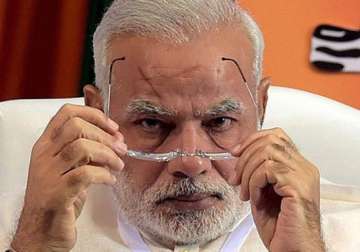PM Modi in US: Trump’s ‘true friend’ tweet sets tone for meeting; defence ties, counter-terrorism high on agenda
The meeting is grabbing the attention of nations across the world as PM Modi is the first foreign leader to be invited by the Trump administration for a “working dinner” at the White House

The stage is set for Prime Minister Narendra Modi’s maiden meeting with US President Donald Trump on Monday. The meeting is grabbing the attention of nations across the world as PM Modi is the first foreign leader to be invited by the Trump administration for a “working dinner” at the White House.
Trump’s description of PM Modi as a “true friend” has already set the tone for a productive maiden meeting between the two leaders.
“Look forward to welcoming India's PM Modi to @WhiteHouse on Monday. Important strategic issues to discuss with a true friend,” he has tweeted ahead of PM Modi reaching Washington DC.
PM Modi, in return, thanked Trump for the warm welcome rendered to him, while saying that he was looking forward to discussions with the latter. “Thank you @POTUS for the warm personal welcome. Greatly look forward to my meeting and discussions with you @realDonaldTrump,” he tweeted.
However, the future course of bilateral bilateral partnership will depend how both sides can deliver on each other’s priorities on a host of issues, such as over the Asia-Pacific and Afghanistan-Pakistan regions, defence, immigration and trade.
The agenda is also likely to cover some complicated issues like the H-1B visas, Paris climate pact and Make in India. One of the key concerns on the Indian side is the issue of H1B visas for Indian professionals. US officials said on Friday that if the matter comes up, the American administration will respond to it.
During the meetings, India would also look at the US for stronger cooperation on counter-terrorism and cross-border terrorism emanating from Pakistan.
“The US and India are both committed to combating all forms of terrorism and strengthening their cooperation in areas like terrorist screening, intelligence and information sharing, terrorists’ use of the Internet, and, of course, terrorist designations,” a US official was quoted by The Indian Express as saying.
“I think we can expect to see some new initiatives on counter-terrorism cooperation,” he added.
The meeting is also an opportunity for both sides to set their priorities, building on achievements from the Bush and Obama administrations.
The Indo-US civil nuclear deal is expected to figure during talks, but a pact between the NPCIL and Westinghouse to build six power reactors in Andhra Pradesh is unlikely to be signed.
A host of strategic issues are expected to be discussed during the parleys between the leaders of the world's two largest democracies, including the progress on the 2008 civil nuclear deal, according to official sources here. They said a financial turmoil in Westinghouse and absence of a functional reference atomic plant were the main impediments behind the Nuclear Power Corporation of India Limited's (NPCIL) unwillingness to sign the agreement with the American nuclear giant.
According to a joint statement by Modi and the then US president Barack Obama in 2015, both the sides had resolved to work towards "finalising the contractual agreement by June 2017". However, a lot of water has flown under the bridge since then.
Westinghouse, which was acquired by Japanese conglomerate Toshiba in 2007, filed for bankruptcy in March. Apprehending uncertainty, the Department of Atomic Energy (DAE) and the NPCIL are unwilling to go ahead with any agreement with the beleaguered company till it comes out of the financial turmoil.
The Defence Technology and Trade Initiative that facilitates American arms technology transfers to India will be pushed by the PM.
There are reports that the two leaders could hold discussions on a proposal for India to buy 100 armed Predator drones made by General Atomics and over support for India’s plans for a nuclear-powered aircraft carrier.
Besides enhancing defence ties, terrorism in South Asia and Pakistan’s role in sponsoring terror, and China’s ambitions in the Asia-Pacific region will be other key strategic issues that will be on the agenda.
The Trump administration, just days ahead of Modi’s visit, announced an inter-agency review of American support to Pakistan, which may lead to a reduction in US aid for Pak. The Modi government, on its part, wants stronger commitment from the Trump administration to fight Pak-based terror groups, including JeM and LeT.
The two leaders could put in place a mechanism or arrangement for a joint economic partnership in the Asia-Pacific region, taking forward their 2015 joint vision to stabilise the region where China is now emerging as a leading power.
Chinese media on Sunday showed interest in the meeting as it may bring some significant changes to the India-US bilateral ties which also concern China's interests. An article in the state-run Global Times said, “It will be interesting to see how Modi's visit to the US will influence the two countries' bilateral economic ties.”